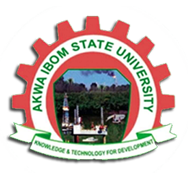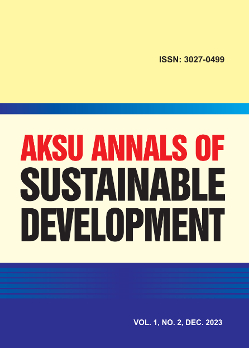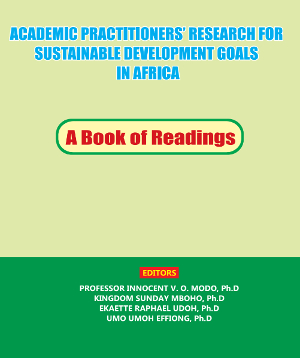ECONOMIC DEVELOPMENT AND SUSTAINABLE POVERTY ALLEVIATION POLICIESIN NIGERIA
DOI:
https://doi.org/10.60787/AASD-v2i1-29Keywords:
Poverty, Government, Economic and Development, PoliciesAbstract
Over the time, successive governments in Nigerian formulated several economic development policies to enhance the livelihood of her citizens, but unfortunately, the economic benefit appears significantly low. This study seeks to assess the impact of government policies on sustainable economic development specifically on poverty alleviation initiatives in the country. The research adopted a qualitative method with a combination of exploratory, descriptive and contextual approaches to analyze its data which mostly was obtained from existing secondary sources. Public choice theory was adopted as a theoretical framework to guide the study. Findings of the study revealed that the Nigerian government has formulated various policies but with faulty implementation processes. However, it was recommended among others that; Government policies on poverty alleviation should be adequately funded for sustainable economic development of Nigeria .Government should also design appropriate programme involving the beneficiaries in the formulation and the implementation stages of any programme.
Downloads
References
Anderson, J. (1974). Public Policy Making. New
York. Praeger.
Armstrong, M. (2006). A Handbook of Human
Resource Management Noida, India: Gopsen
Paper Limited. India.
Atairet, A. C. (2020) Implementation of Local
economic empowerment strategy
(LEEDS)inHealth & Education Sectors in
AkwaIbom State, Nigeria – An assessment.
International Journal of Technical research &
Science 5(10).
Atairet, A.C.,Atairet, E A., & Joseph, O. M. (2021)
Implementation of rural development
programs / Policies in Nigeria: A sustainable
development perspective. KIU Interdisciplinary
Journal of Humanities and Social Sciences.2(1).
Abin, L. P. (2018). A critical study of N-Power
Programme Implementation Process in
Akwanga Metropolis of Nasarawa State.
Atakpa, R. (2016). Entrepreneurship education in
tertiary institutions in Nigeria: Relevance,
Challenges and Strategies. Online Journal or
Arts, Management and Social Science
(OJAMSS), 1(2), 84-89.
Aibieyi, S. and Dirisu, O. (2010) National Poverty
Eradication Programmes in Nigeria: Problems
and Prospects. A Journal of Contemporary
Research 7(2)DOI:10.4314/lwati.v7i2.57550
Bamgbose, A. (1981). Language and the Nation:
Language Question in Sub-Saharan Africa.
Edinburg: University Edinburg.
Bassey, C. O. and Agbor, U. I. (2015).Public Policy
and Politics in Nigeria: A critical Discourse.
Concept Publications Limited, Lagos, Nigeria.
Babie and Monton (2001).The Practice of Social
Research, 9th Edition.Belmount C. A.
Wadsworth/Thompson Learning.
Dye, T. R. (1995). Understanding Public Policy
(8thed.) New Jersey. Practice Hall.
Effiong, U., Ekanem, A., and Ottong, I. (2023).
Inclusive Education and Sustainable
Learning Opportunities for Persons with
Disabilities in AkwaIbom State University,
ObioAkpa Campus, Nigeria.In: Innocent V. O.
Modo, Kingdom S.Mboho, EkaetteR.Udoh and
UmoU.Effiong (Eds) Academic Practioners
Research for Sustainable Development Goals in
Africa. ICIDR Publishing House: IkotEkpene.
Demise, A. (2023). A Comparative Approach to
Policy Analysis: Health Care Delivery in Four
Nations. Cambridge: Cambridge University
Press.
Effiong, U. U., Udoyen, G., and Udoh, E. (2021).
Ecological Determinism and Prospects of
Ecotourism Development in the Niger Delta,
Nigeria.AKSU Journal ofSocial Sciences, 1(1),
-286.
Effiong, U. U., (2024).Social Security in Nigeria.In
Destiny EzeAgwanwo (Eds.).Social Work and
Social Legislations in Nigeria. Prime Publishers
and Educational Services: Ibadan.
Egonwan, L. A. (2000) Public Policy Analysis”
Concepts and Applications Revised
edition.Benin City. Resyin Nigeria Company.
Eyestone, Robert (1971:18). The Threads of Public
Policy: A Study in Policy Leadership.
Indianapolis: Boobs-Merill.
Eminue, O. E. (2005) Public Policy Analysis and
Decision Making. Lagos: Concept Publications.
Ekpo, A. H.(2000). The Dialectics of Rural
Development: Theory and Evidence. In Ebong,
M.(ed.,). Mobilization of resources for Rural
Development in Nigeria University of Calabar
Elugbe, B..(1990) National language and national
development. In: E N Emenanjo (Ed.):
Multilingualism, Minority Languages and
Language Policy in Nigeria. Agbor: Central
Books 102: 16-32.
Friedrich, H. “Economic Growth and Sustainable
Development” Knowledge Management
Organisation Intelligence and Learning
Complexities VOl. 111. Encyclopedia of Life
Support System (EOLSS).
Harbison , H. (1966). Industrialism and industrial
man: The problems of labor and management
in economic growth (Books on sociology).
Ibe, E (2014). Gender and Scientific Literacy levels:
Implications for sustainable science and
Technology Education (STE) for the 21st
Century jobs. Journal of Education and
Practice: International Institute for Science,
Technology and Education (IISTE) 5 (8) 113-
Ikelegbe, A. O. (1994). Public Policy-Making and
Analysis. Benin City: Uri Publishing Limited.
Ibok, E., & Tom, E. (2010). Introduction to Local
Government Administration in Nigeria:
Contemporary issues. Uyo: Edison.
Iheriohanma, B (2003). The Challenges of Youths’
Involvement in Violence, Conflicts and Crises
Management in Igboland, Nigeria Journal of
Social Sciences 22(2):77-84.
Jhingan, M. L. (2008). The Economic of Development
and Planning. Delhi: Vrinda Publications (P)
Limited.
Kalu, P. (2010:6). Industrialization and Energy Crisis
Administration and National Development.A
Festschrift in Honour of Engr.
OnyekwereNwankwo. Ibadan: Kraft
Publications.
Kayode, A. (2014). Rising rate of unemployment in
Nigeria: The Socio-Economic and Political
Implications. Global Business and Economic
Research Journal, 3(1).
Mboho, K., andEffiong, U.(2024).Social Values,
Negative Attitudes and Conducts in Nigeria. In:
I.V.O. Modo and Kingdom Sunday Mboho
(Eds). The Perspective of Nigerian Peoples and
Culture. ICIDR Publishing House, IkotEkpene.
N-Power (2017). N-Power Information Guide:
Federal Government of Nigeria, National Social
Investment Programme.
Nnadi, F. (2008) Determinants of Youth’s
Participation in Rural Agriculture in Imo State,
Nigeria.Journal of Applied Sciences, Vol. 8.
Onah, F. O. (1995). Substantial Development and
Women Employment Situation in Nigeria’
NJPALG Vol. 7:1.
Obadan, M. O. (2017). Analytical framework for
poverty reduction: Issues of Economic Growth
versus other Strategies Proceedings of the
Nigerian Economic Society’s Annual
Conference, 1-18.
Okoro, S., N. &Bassey, U. E. (2018). N-Power
teachers competence and resource utilization:
Implication for effective and efficient teaching
in Nigerian primary and post primary schools.
International Journal of Education and
Evaluation 4(1), 53-62.
Okafor , S, Mba , S andOleribe, c (2013). Modelling
microfinance management forindustrialization
and economic development of Nigeria: Factor
analytic approach.Journal of Economic
Studies 10(1):21-31.
Rodney, W. (1972).How Europe underdeveloped
Africa.Lodon: Bogle-Loveuture Publication.
Robert, S. (2004). Fair Play: The Ethics of Sport,
Second Edition (Boulder: Westview Press.
Stephen, M. and Mosse, I. (2021). Theory and
Practice of Public Policy Analysis: The Nigerian
Experience. Enugu: Bismark Publications.
Sharkansky, I. & Meter, D.(2015) Policy and Politics
in American Government. New York: McGraw
Hill Book Co. Ltd.
Todaro, M. P. (2004) Economic Development. New
Delhi: NutechPhotolithogaphers.
Todaro, M.(1981) Economic Development in the
third world. New York: Longman.
Terry , W. (2007). Public Policy. Cheltenham:
Edward Elgar
Tullock, G. (1962) The Calculus of Consent: Logical
Foundations for Constitutional Democracy. The
University of Michigan Press, Michigan.
Thomas C. (1997) “Development and Inequality” in
White B; Little, R; and Smith, M(ed) Issues in
World Politics. London: Macmillan Press.
Thomas, H.(2017) Poverty and the WTO: New York:
Palgrave Macmillan.UNDP, Human
Development Poverty from Human
Development Perspective New York, 1990-
Udoh, U.S., and Iheanyichukwu, O.R. (2017). Nigeria
and the Politics of Restructuring: South-South
and South-East perspectives. AKSU Journal of
ManagementSciences, 2( 2), pp. 97-104.
Udoh, U.S. (2021).Indigenization of Nigeria’s Economy
and Sustainable Self-Reliance.AKSU Journal of
Administration and Corporate Governance
(AKSUJACOG), Volume 1(1).
Udoms, B. E., &Atapkpa, O. E., (2021). Governance
deficit, Nigeria’s national security and national
development: The ENDSARA Perspective. AKSU
Journal of Administration and Corporate
Governance, 1(1), 1-29.
Ugwuanyi B. I and Emma, O. (2013) Enhancing Rural
Development in Nigeria: Periscoping the
Impediments and Exploring Imperative
Measures. Kuwait Chapter of Arabian Journal
of Business and Management Review, 2(7).
Umoh, E.U.,Ekpo, O.J., Effiong, U.U., and Asangausung,
O. S. (2023). Entrepreneurship Education
And Acquisition of Employability Skills among
Business Administration Students of University
of Uyo.AKSU Annals of Sustainable
Development,1(2),
https://doi.org/10.60787/AASD-v1i2-25
Van Meter, D. S. (1977).The Implementation of Intergovernmental Policy Studies Review.London:
Stage Publications.
Vinceta Sign (2014). “An Impact and Challenges of
Sustainable Development in Global Era”
.Journal of Economics and Development
Studies.
World Bank (2022) World bank report 1990 Poverty.
Washington. D.C
Zimmerman, Michael (2009). Environment” Encarta.
Redmond, WA: Microsoft. Corporation.
Downloads
Published
Issue
Section
License
Copyright (c) 2024 AKSU Annals of Sustainable Development

This work is licensed under a Creative Commons Attribution-NonCommercial-NoDerivatives 4.0 International License.
Manuscript content on this site is licensed under Creative Commons Licenses. Authors wishing to include figures, tables, or text passages that have already been published elsewhere are required to obtain permission from the copyright owner(s) for both the print and online format and to include evidence that such permission has been granted when submitting their papers. Any material received without such evidence will be assumed to originate from the authors.





 ICIDR Publishing House
ICIDR Publishing House